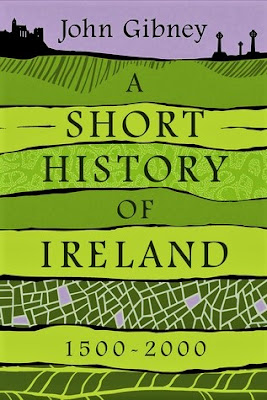John Gibney's A Short History of Ireland, 1500-2000 (New Haven: Yale University Press, 2017) provides an overview of modern Irish history and concludes each chapter with a "Where Historians Disagree" section.
After reading this and Thomas Bartlett's Ireland: A History (Cambridge University Press, 2010), one thing's clear: the state of affairs in Ireland at the beginning of the 21st century would seem to be far preferable to those of the 1500s and 1600s.
Anyone who's delved into Irish history will probably know something of the horrors of Oliver Cromwell's activities in the 1600s, but the preceding Elizabethan period was also quite devastating to the Irish people, lands and ecology. Let's dive in, shall we?
In the 1500s, "Ireland offered scope for the unscrupulous to enrich themselves in ways that undermined any claim by the [English] authorities to be acting as honest and impartial brokers . . ." (page 27)
There was "a rise in the levels of violence employed by the Tudor state . . . increasing use of martial law from the 1550s onward . . . In July 1575 the earl of Essex . . . had six hundred men, women, and children killed on Rathlin Island, the stronghold of the MacDonnells, under a commission of martial law. This was gradually extended across Ireland as the reign of Elizabeth wore on . . . summary execution became a widespread practice, and decapitated heads became a common feature of conflict, whether as trophies of war or grisly receipts for rewards." (page 27)
And pity anyone who found themselves shipwrecked. "[T]housands of survivors of the Spanish Armada were executed in 1588 by [order of Sir Richard] Bingham on the coasts of Galway, Mayo, and Sligo . . ." (pages 27-28)
"[I]n June 1602 [Charles Blount] Mountjoy embarked on a scorched-earth campaign whose systematic nature and sheer scale marked it out as distinctive . . . livestock, crops, buildings, and people were simply eradicated across the north of the island." (pages 40-41)
By the time Gibney reaches the 20th century, one is not at all surprised by the Easter Rising of 1916, the Irish Civil War, the Emergency (World War II period), nor the Troubles, nor by mass emigration in the wake of the Potato Famine in the mid-19th century.
With the arrival of the 21st century, there is peace at last -- but also a looming Brexit and its attendant fallout. Still, much better than martial law and mass beheadings -- and Ireland finally wins.
Today's Rune: Breakthrough.
After reading this and Thomas Bartlett's Ireland: A History (Cambridge University Press, 2010), one thing's clear: the state of affairs in Ireland at the beginning of the 21st century would seem to be far preferable to those of the 1500s and 1600s.
Anyone who's delved into Irish history will probably know something of the horrors of Oliver Cromwell's activities in the 1600s, but the preceding Elizabethan period was also quite devastating to the Irish people, lands and ecology. Let's dive in, shall we?
In the 1500s, "Ireland offered scope for the unscrupulous to enrich themselves in ways that undermined any claim by the [English] authorities to be acting as honest and impartial brokers . . ." (page 27)
There was "a rise in the levels of violence employed by the Tudor state . . . increasing use of martial law from the 1550s onward . . . In July 1575 the earl of Essex . . . had six hundred men, women, and children killed on Rathlin Island, the stronghold of the MacDonnells, under a commission of martial law. This was gradually extended across Ireland as the reign of Elizabeth wore on . . . summary execution became a widespread practice, and decapitated heads became a common feature of conflict, whether as trophies of war or grisly receipts for rewards." (page 27)
And pity anyone who found themselves shipwrecked. "[T]housands of survivors of the Spanish Armada were executed in 1588 by [order of Sir Richard] Bingham on the coasts of Galway, Mayo, and Sligo . . ." (pages 27-28)
"[I]n June 1602 [Charles Blount] Mountjoy embarked on a scorched-earth campaign whose systematic nature and sheer scale marked it out as distinctive . . . livestock, crops, buildings, and people were simply eradicated across the north of the island." (pages 40-41)
By the time Gibney reaches the 20th century, one is not at all surprised by the Easter Rising of 1916, the Irish Civil War, the Emergency (World War II period), nor the Troubles, nor by mass emigration in the wake of the Potato Famine in the mid-19th century.
With the arrival of the 21st century, there is peace at last -- but also a looming Brexit and its attendant fallout. Still, much better than martial law and mass beheadings -- and Ireland finally wins.
Today's Rune: Breakthrough.











1 comment:
and what a history.
Post a Comment